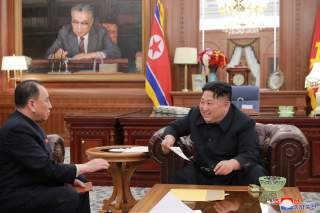The Hanoi Summit – We Asked Gordon Chang What Happens Next in U.S.-North Korea Relations
"Unfortunately, the current ruler is in a system that does not allow him to reciprocate good will."
Editor’s Note: Looking for more opinions on where we go after the Hanoi summit? Check out all 80 expert takes on where U.S-North Korea relations go next here.
Jimmy Carter last week said he is willing to go to Pyongyang to help end the impasse between the United States and North Korea.
Don’t be optimistic. The Democratic People’s Republic of Korea is not in a compromising mood. It put forth a ludicrously bold proposal in Hanoi, and President Donald Trump had no choice but to walk away without clinching a deal.
Yet Trump, despite the North’s hard tactics, made a good will gesture after the end of the talks. The American leader on March 3 cancelled the high-profile Key Resolve and Foal Eagle joint exercises between the U.S. and South Korea. In their place, the two militaries announced a much smaller drill, called Dong Maeng, or “Alliance.” The replacement, which started March 4, ends March 12.
Pyongyang was in no mood to accept the gift. “The ill-boding moves of the south Korean military authorities and the U.S. are a wanton violation of the DPRK-U.S. joint statement and the north-south declarations in which the removal of hostility and tensions were committed to,” the official Korean Central News Agency thundered Thursday. It called the drills “an open challenge to the aspiration and desire of all Koreans and the international community for peace and stability on the Korean Peninsula.”
KCNA neglected to point out that the regime’s Korean People’s Army was in the midst of its massive Winter Training Cycle. As David Maxwell of the Foundation for Defense of Democracies told the National Interest, this four-month exercise normally wraps up at the end of March. “This training,” he noted, “brings the Korean People’s Army to the highest state of offensive readiness at the optimal attack time of March, when the ground is frozen and the farmers have not flooded the rice paddies in the South.”
Moreover, Kim Jong-un’s initial response to the failure of Hanoi was to begin rebuilding the Sohae satellite launch facility, which last year he promised to dismantle as a confidence building measure.
Kim rulers may change, but the family’s playbook does not. Carter should know that by now. His landmark North Korea achievement—the Agreed Framework of October 1994—was a failure. Kim Jong-il, the father of Kim Jong-un, continued a surreptitious uranium-enrichment program in violation of the deal’s terms, thereby dishonoring the pact from the get-go.
We would all like to think, as do Carter and Trump, that the United States can come to terms with Kim Jong-un, but no country has ever figured out how to entice the Kims into good behavior. Unfortunately, the current ruler is in a system that does not allow him to reciprocate good will. There are few signs that cooperation is now possible.
Gordon G. Chang is the author of Nuclear Showdown: North Korea Takes On the World and the forthcoming Losing South Korea. Follow him on Twitter @GordonGChang.
Image: Reuters

